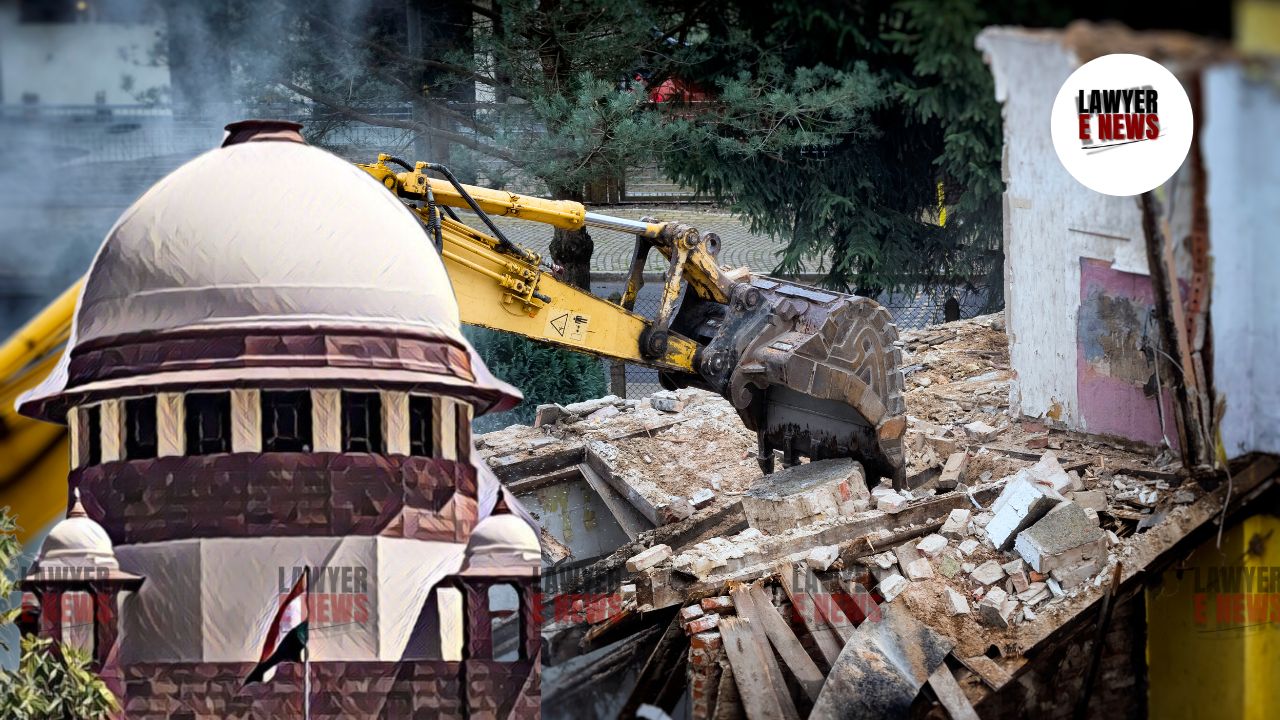-
by Admin
15 February 2026 5:35 AM



Supreme Court dismissed a contempt petition filed by the National Federation of Indian Women (NFIW), which challenged property demolitions in Uttarakhand, Rajasthan, and Uttar Pradesh. The NFIW alleged that these demolitions violated a prior Supreme Court order that restricted such actions without explicit judicial approval. However, the Court declined to entertain the petition, noting that the petitioner had no direct involvement with the properties in question and clarifying that it would only consider cases brought forward by those personally affected by the demolitions.
"Only Those Directly Affected Should Approach Us": Supreme Court Emphasizes Standing for Contempt Petitions
During the hearing, the Court underscored that only individuals directly impacted by property demolitions could file contempt petitions. The Bench, comprising Justice B.R. Gavai, Justice P.K. Mishra, and Justice K.V. Viswanathan, dismissed NFIW’s claims as lacking sufficient standing. NFIW’s Counsel argued that properties in Haridwar, Jaipur, and Kanpur were demolished in violation of the Court’s previous orders, which mandated prior approval for such actions. The Counsel presented media reports and videos as evidence.
The Bench, however, found the arguments unconvincing, ruling that allegations based on media reports were inadequate grounds to justify a contempt petition.
"If, by violation of our order, somebody's structure is demolished, we will take care of that," remarked Justice Gavai, emphasizing the need for directly affected parties to approach the Court for relief.
Alleged Instances of Demolitions Without Court Approval
NFIW’s petition was linked to an ongoing writ petition addressing the legality of demolition drives across several states. The petition cited three specific instances of demolitions allegedly conducted in violation of the Court's orders:
Haridwar, Uttarakhand (October 19, 2024): A mazar (mausoleum) was demolished by the district administration under heavy security.
Jaipur, Rajasthan (October 20, 2024): A portion of a building was demolished, allegedly in connection to a temple stabbing incident involving RSS workers.
Kanpur, Uttar Pradesh (October 21, 2024): A restaurant owned by a Muslim man was demolished after the Bajrang Dal accused the owner of concealing his identity and serving non-vegetarian food disguised as vegetarian.
The NFIW’s Counsel contended that these demolitions were punitive, extrajudicial actions that directly contravened the Court’s earlier directive prohibiting demolitions without its explicit consent. The Counsel urged the Court to take action, arguing that these demolitions amounted to gross contempt of the Court’s stay order.
State’s Defense: Demolitions Were Lawful and Petition Based on Media Speculation
Additional Solicitor General (ASG) KM Nataraj, representing the State of Uttar Pradesh, contested the NFIW's claims, arguing that the petition was based on speculative media reports rather than factual evidence. He asserted that the petitioner was a third party with no direct knowledge of the events and that the demolition in Kanpur related to the removal of an encroachment on a footpath, which was exempt from the Court’s order.
"Some newspaper has reported it, and he has filed an application based on that," ASG Nataraj stated, dismissing the petition as speculative and disconnected from the legal parameters set forth in the Supreme Court’s earlier ruling.
Request for Suo Motu Cognizance Rejected
The NFIW’s Counsel urged the Court to take suo motu cognizance of the demolitions, arguing that many of those affected lacked the resources to approach the Court on their own. Justice Gavai firmly rejected this request, stating,
"Don't say that. Please just don't say that."
The Bench reiterated its stance that it would not entertain petitions based on third-party submissions or speculative claims and would only intervene when those directly impacted by the demolitions brought their cases forward.
Previous Supreme Court Order on Demolitions
The petition was rooted in a September 17, 2024, Supreme Court order issued in the case of Jamiat Ulama-i-Hind v. North Delhi Municipal Corporation, where the Court restrained authorities from conducting demolitions without its explicit consent until October 1, 2024. This order was part of ongoing litigation challenging the legality of mass demolition drives across several states.
However, the Court’s order did not apply to unauthorized structures on public roads, footpaths, railway lines, or public spaces like water bodies. NFIW argued that the demolitions cited in its petition did not fall within these exceptions and, therefore, constituted violations of the Court's ruling.
The Supreme Court’s dismissal of the NFIW’s contempt petition reflects its cautious approach to third-party allegations, particularly those based on media reports or indirect accounts. The Court reaffirmed its position that only individuals directly affected by demolitions could bring forth claims of contempt for violating its previous orders.
The decision underscores the complexities involved in enforcing judicial orders amid widespread demolition drives across the country. However, the Court’s message remains clear: only those personally impacted can seek recourse for alleged violations of its rulings.
Date of Decision: October 24, 2024
National Federation of Indian Women v. Rajesh Kumar Singh | Diary No. 49497/2024
